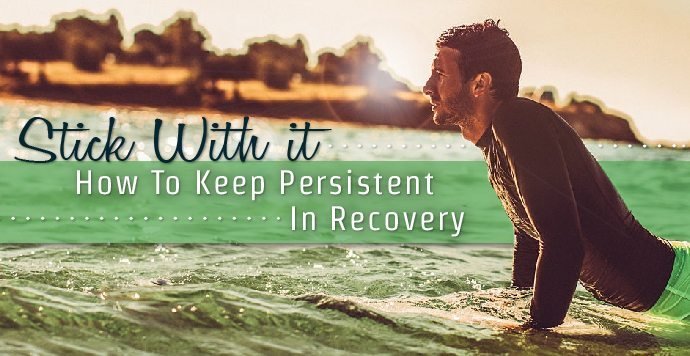Stick With It! How to Keep Persistent in Recovery

In my travels around the country speaking on the topics of addiction and recovery, I frequently get asked these questions:
- Recovery is hard! How do you keep on keeping on?
- How do people continue to remind themselves that recovery is worth it?
- Why is relapse so common, and why do people go back to a life that was so painful?
- What skills are necessary to return to a life of sobriety after a relapse?
All these questions center around one salient topic: the importance of persistence in remaining sober.
In my experience, relapse was part of the process of finally admitting my defeat and deciding that I didn’t want to return to that life. I’ve been to three inpatient treatments and attended multiple outpatient groups (not to mention many other treatment options) before I finally found long-term sobriety over five years ago.
A vital part of continued recovery is the ability to find the endurance and grit to keep at it, because let’s face it . . . the condition never goes away. I still have dreams about using now and then and triggers that I once acted out on still rear their butt-ugly faces. The fact that addiction is a chronic, progressive brain illness is inarguably a scientific fact.
How does a person stick with whatever program they’re following? What are the keys to long-term recovery?
Although I am not trained as a medical professional, I have loads of experience as a person in long-term recovery. Below is a list I’ve compiled from my practical knowledge and first-hand experience with staying sober for the long run.
Endurance Is A Learned Behavior
After my second impatient treatment, I remember at about the two-and-a-half month mark feeling “squirrely.” I thought that I could pick up drinking again, if it were only every once in awhile and I kept it secret.
Alcohol is not my drug of choice (DOC – the substance toward which the addicted individual gravitates most naturally.) Opiates are—with benzos perhaps falling in second place. Still, alcohol was the one most available. Back then, I felt I had little options.
I remember thinking to myself, What the hell are you doing, Dan?! You know what’s going to happen. I chose to ignore the warnings and go back to trying to manage that life.
About a year later, I was arrested for felony trespassing in a blackout from alcohol and benzodiazepines.
While I was standing in a cell in Williston, North Dakota in an anti-suicide smock, I asked myself two questions:
- 1) How did I get here?
- 2) What do I need to do to stay sober?!
The answers to both questions came in my third (and hopefully final) inpatient treatment. I had gotten to that horrible place because I didn’t do what was required of me to keep myself in a good spiritual condition.
Now, maybe you’re thinking that you want to quit reading at this point. I’ve mentioned spirituality and for some people that’s a major turn-off. However, it shouldn’t be. Without going into too much detail (which I do in this article here) let me mention that I see spirituality simply as “doing what it takes to be a decent human being.” Twelve Step recovery offered me this component I was looking for.
The second question—what I needed to do to remain sober—was answered by educating myself about the roots of addiction and how it is a chronic brain disease.
With any chronic illness, the key to staying healthy is learning resilience and endurance.
These traits are learned behaviors—I didn’t know this before. I thought people were born having enough willpower or grit, but that doesn’t seem to be the case. Instead, resilience and endurance must be learned through hard practice.
Many treatment options and modalities for recovery will address the triggers every person in recovery will inevitably face. More importantly, they will teach you how to deal with them, day in and day out—essentially, professionals and/or peers will teach you how to stay the course.
Not Every Day Will Bring Rainbows, Unicorns, Or Roses
It seems obvious enough that life has its ups and downs. Why then are we so surprised when something bad happens?
I can’t answer that question, other than to assume that it’s part of the human condition.
For people in recovery, I’ve discovered it’s helpful to repeat the old AA adage: This, too, shall pass.
When a lousy day comes around, I’ve found it’s more important than ever to talk it through with a person who understands my condition. For me, that’s my Twelve Step sponsor. However, regardless of what recovery modality you follow, the value of talking through your problems with another person who listens and understands is obvious.
Specific therapies, such as experiential therapy or cognitive-behavioral therapy, help a patient gain not only insight into the problems he or she is experiencing, but also addresses the skills needed to gain perspective and resilience. These skills, in turn, help one focus not on the problems themselves, but on solutions that might not be readily apparent.
The point of all of this is that bad days are going to happen. Responding in a healthy way assists you in achieving a more positive outcome.
Never Forget
This last piece of advice I think is the most important. For me, I never want to forget the depths I went to in the throes of my addiction. I do this, because to do otherwise means that I WILL go back to behaving in the same way I did before.
If I forgot my past, I’d return to abusing drugs and alcohol. That’s my experience, anyway. Whenever I thought I was “cured,” I fell back into the patterns that led me to using. For me, staying the course isn’t a matter of sheer self-will. I know this, because whenever I tried to “just don’t use” without any assistance or support, I inescapably found myself in the same situation I did before—miserable, dependent, and dejected.
What I’m getting at with this point is that I’ve made recovery my new way of life . . . my new identity.
I don’t attend meetings just to stay sober anymore. I go because I care about the other people there. I’m one of them and others depend on me. Being a person in long-term recovery is who I am now.
Psychologists have shown that when a person has a complete life transformation, he or she often has embraced a new identity. Persistently and stubbornly claiming that new identity, I’ve found key to my own endurance.
In realizing that I’m a new person, I never want to forget the place I came from, because I know just how easily I can slip back into the behaviors that caused the problems in the first place.
In any event, I try to approach my recovery from a creative point of view to hone or refine the skills I need to stay focused. With me that comes about through my writing and the blog I keep. With you or with someone you care about, it may be something different.
Whatever you decide, realize that each day you stay sober, you’ve achieved an incredible victory. Addiction isn’t easy; it never goes away. However, a life in recovery is ultimately worth it.
Daniel D. Maurer is a freelance writer openly living in long-term recovery. He is the author of Sobriety: A Graphic Novel, a Hazelden Publishing, youth and young adult resource. Daniel is currently working on his fourth book, which covers the topic of resiliency. He lives with his family in Saint Paul, Minnesota.



 Resources about addiction and recovery
Resources about addiction and recovery
